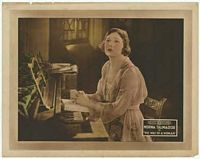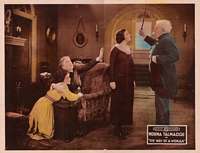

The Way of a Woman (1919) Norma Talmadge Film Corporation/Select Pictures Corporation. Produced by Joseph M. Schenck. Directed by Robert Z. Leonard. Scenario by Eugene Wlateer. Camera by David Abel. Gowns by Lucile. Cast: Norma Talmadge, Conway Tearle, Gertrude Berkeley, Frank De Vernon, Mae McAvoy, Jobyna Howland, Hassard Short, George La Guere, William Humphreys, Stuart Holmes. 5 reels. A 35mm. negative of this film is located at the National Film and Television Museum, London (final scene is missing)
 |
Norma in a lovely Lucile-designed gown in a lobby card for this film. Thanks to Randy Bigham for this photo. Click on thumbnail for larger view. For picture of Norma wearing this gown offscreen, click here |  | A lobby card from the film (thanks to Derek Boothroyd for this one) |
| Nancy Lee | Norma Talmadge |
| Anthony Weir | Conway Tearle |
| Mrs. Lee | Gertrude Berkeley |
| Mr. Lee | Colonel Vernon |
| Grace Lee | Mae McAvoy |
| Mollie Wise | Jobyna Howland |
| Johnnie Flinch | Hassard Short |
| Douglas Weir | George LaGuerre |
| Nathan Caspar | William Humphreys |
| George Trevor | Stuart Holmes |
The latest Select release starring Norma Talmadge is a screen adaptation of the Eugene Walter play, "Nancy Lee," presented under the title of "The Way of a Woman." In it Miss Talmadge comes back to her own, for the story is of the type that is best suited to her, and the production has been wonderfully well handled under the direction of Robert Z. Leonard. It is a picture production that will pull patronage to any house and satisfy any audience.
There has been no money saved in the production or cast, and the producers could well hang out the "all-star cast" sign on this picture. Supporting Miss Talmadge are Jobyna Howland, Conway Tearle, George LeGuerre, Stuart Holmes, Hazzard Short and others equally as well known. The picture itself abounds in pretty sets, and the star herself outdoes her best previous work.
The story of "The Way of a Woman" is that of a proud Southern girl of an impoverished family who comes to New York to make her way. She skates along the thin ice that divides the line between the salamander and "detained lady" and loses the man that she loves when she marries a Broadway rounder for his money, so that she will be able to contribute lavishly to the support of the old folks at home. The death of her husband and the return of the real man of her heart and the complications that beset the reconciliation of the two form the basis of the plot. It is well worked out, with plenty of comedy interest to send the laugh along in the right place.
Miss Talmadge handled the role of the Southern girl most cleverly, but to Jobyna Howland must go the credit for the laugh producing of the picture. These are the two women of the picture who stand out. In the male section Conway Tearle, George LeGuerre and Stuart Holmes. Hazzard Short acts as a comedy foil for Miss Howland.
In directing the story Mr. Leonard developed it consistently, and his action at all times furthers the trend of the story. The photography and the lighting are very good throughout.
"The Way of a Woman" will land anywhere.
"The Way of a Woman," with Norma Talmadge in the leading role, and Conway Tearle, Jobyna Howland, and Hassard Short, and George La Guerre in the important parts, is the photoplay at the Rivoli. This is a cast that comparatively few photoplays can equal. Some of those in it may be good on the stage, but they are also good pantomimists, and that is what counts on the screen.
The photoplay is an adaptation by Eugene Walter from his play, "Nancy Lee," and something of Mr. Walter's skill in plot weaving is seen in it. There are moments when the story actually dominates the scene--a relatively rare thing in photoplays. At other times, however, the story sags and drags, and this seems to be due, for the most part, to its pictorial inadequacy. It depends too much upon words. There are long conversational and descriptive subtitles where there should be moving pictures or nothing. It was not possible to tell the story or at least its main incidents, in pictures, then it was not adaptable to the screen and should not have been used. When the work of a photoplay is left to words it is not done.
Nancy Lee is a Virginian girl, one of the F.F.V.s. Her father forbids her to marry the man she loves "because he is not good enough," and subsequently she marries a man she does not love because she and her family need his money. He lives in the White Lights of Broadway, and when he dies leaves his wife an uncertain income and a group of unprofitable friends. Her efforts to extricate herself seem to be the scheming of a vampire; she becomes involved in a disagreeable situation in which her former suitor misjudges her, and it is only after a succession of difficulties that everything is all right again.
"The Way of a Woman"
A Select Picture Presenting Norma Talmadge in an Adaptation from "Nancy Lee."
Reviewed by Louis Reeves Harrison.
DEPENDENT almost wholly for interest upon the personality of Norma Talmadge, the story and characterizations being seriously at fault, "The Way of a Woman" is far below other productions in which the star has appeared and does not offer her any strong opportunity. Here is a bright star supported by a capable company of actors and called upon to express social and spiritual values through a story so weakly transformed for screen purposes that it is neither faithful to the original from which it came nor to the principles of the medium through which it is presented. Through numerous lapses of time and changing scenes, interspersed with many stupid and explanatory subtitles, the spectator is asked to follow the course pursued by a girl announced to be derived from one of the finest American families.
It is far from complimentary to American intelligence that such characterizations are announced as nationally representative, as scarcely anything she does would be done by any well-educated girl of good family in this country. As the story is not natural it fails to convince. As it is not a true picture of our life, it only perverts what deserved dramatic truth. The only redemption achieved is through Norma Talmadge, who acts, moves and looks like an American girl of good family. Conway Tearle makes a brave effort to inspire interest in his dull role, as do the others, though less hopefully. Below the average of previous Select pictures.
Cast.
| Nancy Lee | Norma Talmadge |
| Anthony Weir | Conway Tearle |
| Mrs. Lee | Gertrude Berkeley |
| Mr. Lee | Colonel Vernon |
| Grace Lee | Mae McAvoy |
| Mollie Wise | Jobyna Howland |
| Johnny Flinch | Hassard Short |
| Douglas Weir | George LaGuerre |
| Nathan Caspar | William Humphreys |
| George Trevor | Stuart Holmes |
Adapted from Eugene Walter's play "Nancy Lee"
Directed by Robert Z. Leonard.
The Story.
"The Way of a Woman" is a devious one in the case of Nancy Lee, daughter of a fine old American family. She rejects manly Anthony Weir, of good character and social standing, only to marry soon after a wealthy cad, a drunkard she does not love, who easily succeeds in dragging his wife down to his level before he dies. He does nothing to relieve the impoverished situation of her father and mother. As his widow, she induces the nephew of Anthony Weir to help her until he is ruined and face to face with impending disgrace because of his love for her. This brings his uncle Anthony to the rescue, and an investigation follows.
Anthony demands that Nancy shall repay what she has borrowed. She throws some of her gowns and furs into his arms, another woman witnessing his humiliation. He refuses to accept such payment and settles the obligation himself. Thereupon Nancy, who has pretended to borrow for her parents' sake, establishes herself luxuriously in a country retreat, where she receives some of her husband's boon companions. They are present when Anthony Weir calls. He finds her guiltless of wrong doing and decides to marry her in spite of all. She announces her love for him and accepts him as her second husband.
Last revised, February 8, 2009